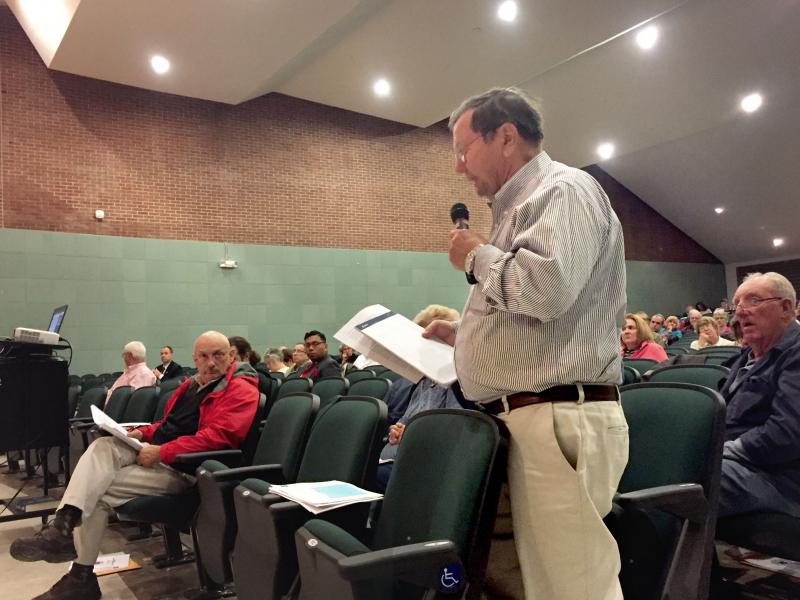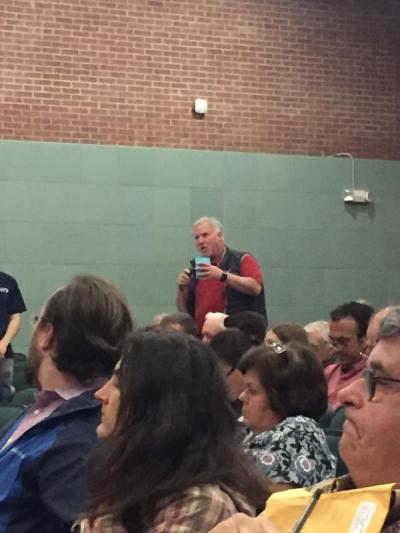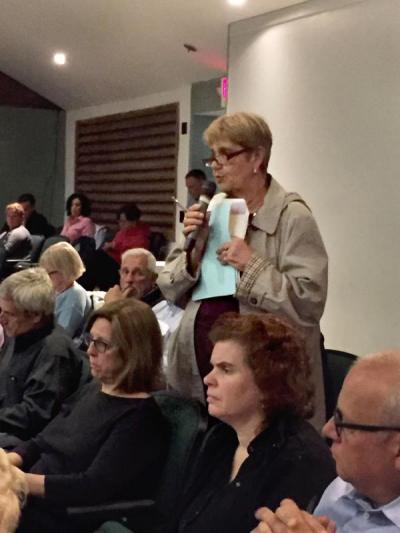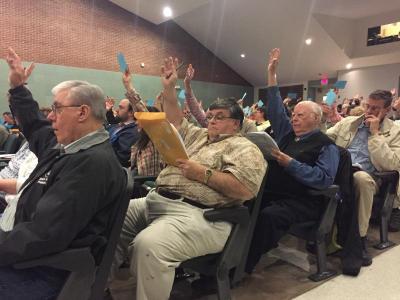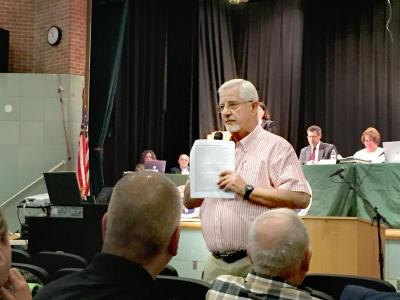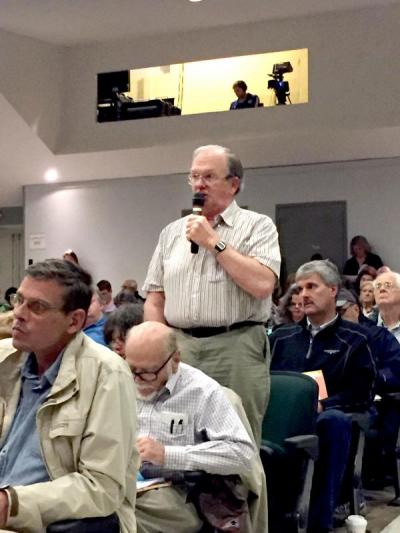Town Meeting members approve budget, police station, noise regulation updates
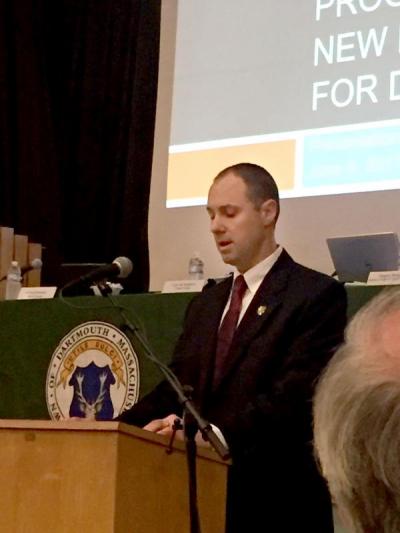
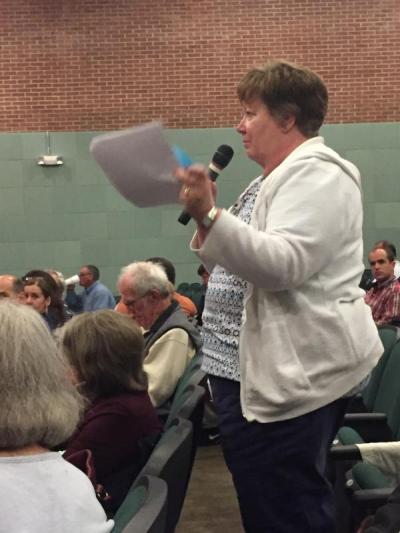
One hundred and sixty five members of Dartmouth’s legislative body gathered at the middle school for Town Meeting on June 6, and ultimately approved the town’s $83.2 million budget, a new police station, ball field funding, and updated noise regulations with little contest.
Officials sought voter approval for a $83,263,173 budget for fiscal year 2018, which begins July 1. Funding will pull nearly $57.7 million from the tax levy; $600,000 from new developments; and $560,528 from debt exclusions — temporary increases on property taxes which are earmarked for certain projects and initiatives.
Town Meeting voters gave the go-ahead to start constructing the new police station at the proposed Tucker Road location. On April 4, voters in the town’s annual election approved a temporary tax increase to fund the $13.4 million police station.
“Clearly we are very pleased. We believe it’s the right choice for the police department and for the town,” said acting Chief Brian Levesque. He said design and bidding will be the next steps, and construction should begin by next spring. The grand opening is anticipated for May 2019.
The station, which will replace the Gidley School, is needed for space, security, improved efficiency, and future growth, according to officials. The police department was moved into modular units in 2014, after bacteria in the water system at its Russells Mills headquarters made an officer sick.
The 21,800 square-foot proposal would include a meeting room that will be accessible to the public; a sally port, which would allow for safe and secure prisoner transport; 3,900 square feet of unused space for future expansion; and work spaces that can be reconfigured for more personnel.
Town Meeting voters asked about equal amenities for female and male officers, warranties, opportunities for environment-friendly improvements, parking, and waterborne pathogens before giving the ‘okay.’
Voter Cyndi Mikkelson asked how affirmative action can be implemented when the proposed design offers only 15 women’s lockers and 80 men's lockers. Levesque answered that the department currently has four female officers and 71 male officers, and that hirings are made through the use of the state civil service exam, which rates applicants based on test scores.
“The design exceeds any capacity we’ve had [for female officers] in the past,” said Levesque.
Project Manager Richard Pomroy said that the equipment warranties span multiple years. He added that while the standard for workmanship warranties is one year, they will require a two-year warranty from the contractor so any unanticipated issues will be addressed.
Architect Greg Carell assured voters that the building would be LEED certified — speaking to the green building rating system — but that the administrative costs of actually getting the certifications were not part of the budget. He said the mechanical and electrical systems meet LEED code and criteria. The project uses an existing site, as opposed to developing a new one. There is room for solar panels, and the heating system is efficient and economical, Carell said.
Pomroy said that the parking lot will accommodate police operations, vehicle and trailer storage, visitors, and the requirements for meeting room. However, during the construction, visitors will have to use parking across the street, he said.
One Town Meeting member asked about provisions to protect against the waterborne pathogens that made an officer sick and caused the entire department to move into modular units behind the Russells Mills headquarters. Town Administrator David Cressman explained that the Russells Mills Road building had been renovated many times, and that piping was left behind in the walls which led to the bacteria’s spread.
“We’re working now with a new station. Probably, there won’t be a problem of buried, hidden pipes,” he said.
Applause echoed throughout the middle school auditorium after the proposal was approved.
After postponing noise bylaw updates last fall, Town Meeting members agreed on and approved a revised version that would give police the tools necessary to enforce noise control.
The proposed updates expand the regulations to include sound from vehicles, power tools, and dumpsters. Officials drew from regulations in similar communities to update the laws that formerly focused on musical instruments and electronic devices, as well as unusually loud whistling or shouting.
The original concern was that the stricter regulations would negatively impact small business owners. The updated regulations address noise from motor vehicles, snow vehicles, recreational vehicles, jet skis, and air boats; construction, demolition, and commercial landscaping activities; domestic power tools including lawnmowers, leaf blowers, and chainsaws; and dumpsters and trash receptacles.
STIPENDS FOR ELECTED OFFICIALS
In fiscal year 2009, Town Meeting members discontinued stipends for elected officials. Acting as a Town Meeting member, Select Board member Stan Mickelson tried to reinstate nearly $20,000 in stipends.
“My proposal doesn’t include benefits for anyone in the town,” he said. “It attracts good, qualified people. I think the town owes it to these good, hardworking people,” he added.
The proposal included $2,400 for each of the five Select Board members; $1,000 for each of the three Board of Assessors members; $525 for each of three Board of Health members; $525 for each of five Planning Board members; and $250 for the Town Moderator.
“Most of us are willing to serve for free. We do not have the new growth to support this going forward,” said Selectman John Haran.
Selectman Shawn McDonald agreed, adding, “Are there expenses out of my pocket? Yeah. We do this because we love it.”
Town Meeting member Silavong Phimmasone sided with Mickelson, adding that the stipends would attract more talent. “These positions do a lot of work,” he said.
“If we want to be representative, we do have to be broader in our thinking,” added Lara Stone, also siding with Mickelson.
“When you first took the job, you knew you weren’t getting paid. You’ve [already] got a job that pays you. I don’t think it’s right,” said Nathalie Dias, who served two terms on the Select Board.
Voter Cyndi Mikkelson asked first for a full study of expenses, and that the proposal be written up on the Town Meeting agenda instead of being brought up from the floor.
“It’s totally inappropriate to expect us to vote on it here,” said Town Meeting member Steve Roberts.
While Town Meeting members rejected stipends for elected officials, they did approve a 1.25-percent raise for the Town Clerk, the only elected official earning a salary. The raise brings the salary from $72,900 to $73,812.
Town Meeting members voted to appropriate $10,200 from community preservation funding to restore a historic animal pound in Russells Mills Village. The funding will go toward removing trees and stumps growing within the stone structure, explained Howard Baker-Smith, chair of the town’s Community Preservation Committee. He added that pound is one of three such historic structures in the Commonwealth.
The town purchased the pound in the 1830s, at which time a poundkeeper would house and feed strays until owners claimed the animals, explained Historical Commission member Judy Lund.
Town Meeting voters ok’d the use of a $2,996,583 state grant and appropriated the remaining $1,645,000 needed to repair the middle school roof. The $5,894,699 project will replace the 37 roof systems with a white, PVC roof, said School Business Administrator Jim Kiely. He said the roof is complete with a 20-year warranty and a 30-year life expectancy.
“Luckily, I don’t think it’s raining too hard today,” said Kiely. He added that the budget includes doors and ladders for roof access, as well as woodblocking, masonry, and insulation. He added that the original design is not intended to support solar panels. Construction will begin in summer 2019.
CAPITAL PLAN
Voters also approved $5,842,047 in spending for the 2018 capital plan. That money includes $100,000 to construct two tee-ball fields and one Little League field at the back of the Crapo Field lot on Russells Mills Road. The monies would go toward regrading and fencing, but Dartmouth Youth Activities Association President Jim Vieira will still depend on volunteers, donations, and discounted contracting to finish the work.
The capital plan also includes $200,000 toward school technology upgrades, an amount which is allotted every year, and will fund Chromebook carts that would expedite school-wide testing, and upgrades to the high school’s stationary computer labs, said Kiely.
Through the capital plan, the Department of Public Works received $300,000 toward Padanaram’s sidewalks and $1,500,000 to correct a state drinking water violation. The $1.2 million sidewalk project — aimed at creating handicap accessible and pedestrian friendly walkways — will complement portions of Elm, Bridge, and Water streets, said DPW Director David Hickox. The construction will be done by Spring 2018.
The $1.5 million will go toward a detailed analysis and long-term solution, as mandated by the state Department of Environmental Protection for a drinking water violation. A December 7 notice informed residents that trihalomethane (TTHM) levels — a byproduct of chlorine disinfectants reacting with naturally occurring organic matter in the water — were too high. Over many years, drinking TTHMs may result in liver, kidneys, or central nervous system problems, or an increased risk of cancer.
Capital plan funding will also provide the police department with $140,547 for police cruiser replacements, and $250,000 toward radio communications upgrades. The cruiser replacement funds are part of an annual request for four new cruisers, and is divvied up between spring and fall Town Meetings, explained Levesque.
The proposed radio communication updates would improve communications at the northern end of town, as well as prep for the station relocation, said Levesque. It is the first phase in a three-phase upgrade process. Levesque said the total project cost has not yet been calculated.
CIVIL SERVICE
The police department has proposed to eliminate the civil service exam for upcoming captains in an attempt to create a more cohesive management team and avoid a hiring hiatus. However, voters opposed the measure, saying that approving it would allow for politically-influenced hires instead of those based on merit. [More details.]
The civil service exam is a state test given to promotion candidates. The test is given every other year, but there must be four applicants for the test to be administered. Following the exam, candidates are ranked based on their scores, and the town must hire and/or promote in that order unless it has a reason for bypass, he said.
Town Meeting members voted to allocate $2,760,000 toward placing a conservation restriction on about 60 acres near Allens Pond. The conservation restriction would prevent any future development on the parcel. Town Meeting voters also approved the use of $400,000 in grant funding for the project.
The restriction is part of a bigger effort by the Dartmouth Natural Resources Trust, the Buzzards Bay Coalition, and Round the Bend Farm to protect 115 acres around Allens Pond for both passive recreation and agriculture. The property is divided into coastal shrubs and salt marsh in the southern half, and agricultural fields in the north. DNRT will own and manage the southern half as a reserve open to the public, while RTB would own the northern section under an agricultural land easement.
Before approving the proposal, Town Meeting members asked about hunting restrictions and development.
Environmental Affairs Coordinator Michael O’Reilly said that while DNRT does not allow hunting on its properties, the Conservation Commission does. Twenty-five hundred acres of land are owned by the Conservation Commission, he said.
Town assessor Robert Michaud said that developing the land cuts into potential tax revenue for the town. “You have to ask yourself if you’re really giving away a potential tax growth for the town,” he said. “If we tie up land that no one can ever touch again, that’s dangerous for the community.”
O’Reilly responded that most of the conserved lands cannot be developed regardless because they are wetlands.
Town Meeting voters allocated $600,000 in Community Preservation Act funds — raised through a 1½ percent property tax surcharge — toward the $8.1 million acquisition of the 115 acres last fall.
ZONING
Town Meeting members also voted to approve an 18-month moratorium on the recreational marijuana industry and withdraw three other zoning-related proposals.
Although recreational marijuana was legalized in November, state and town governments are still finalizing laws regulating the new industry. Until the laws are clear, the town Planning Board cannot appropriate zoning for such businesses, explained board member Lorri-Ann Miller. She added that the moratorium is not unusual. Municipalities throughout the state have voted in 12- to 18-month delays, she said.
Town Meeting withdrew articles related to multi-family housing along State Road and Bliss Corner, and off-campus student housing that would have affected areas surrounding the University of Massachusetts Dartmouth’s main campus on Old Westport Road and the School of Law on Faunce Corner Road.



